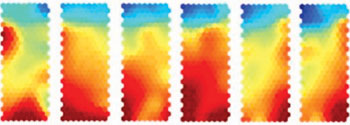“Switch Off Button” Discovered in Autoimmune Disorders
By LabMedica International staff writers
Posted on 23 Sep 2014
Scientists have made an important advance in the fight against debilitating autoimmune diseases such as multiple sclerosis by demonstrating how to stop cells destroy healthy body tissue. Instead of the body’s immune system destroying its own tissue by mistake, researchers have discovered how cells can be transformed from being aggressive to actually protecting against disease.Posted on 23 Sep 2014
The study’s findings were published September 3, 2014, in the journal Nature Communications. It is hoped this latest insight will lead to the widespread use of antigen-specific immunotherapy as a treatment for many autoimmune disorders, including multiple sclerosis (MS), type 1 diabetes, systemic lupus erythematosus (SLE), and Graves’ disease. MS alone affects approximately 2.5 million people worldwide.

Image: Aggressor cells, which have the potential to cause autoimmunity, are targeted by treatment, causing conversion of these cells to protector cells. Gene expression changes gradually at each stage of treatment, as illustrated by the color changes in this series of heat maps (Photo courtesy of the University of Bristol/Dr. Bronwen Burton).
Scientists from the University of Bristol (UK) were able to selectively target the cells that cause autoimmune disease by dampening down their aggression against the body’s own tissues while converting them into cells capable of protecting against disease. This sort of conversion has been earlier applied to allergies, known as allergic desensitization, but its application to autoimmune diseases has only been accepted recently.
The Bristol researchers has now revealed how the administration of fragments of the proteins that are usually the target for attack leads to correction of the autoimmune response. Most significantly, their work reveals that effective treatment is achieved by gradually increasing the dose of antigenic fragment injected.
To determine how this type of immunotherapy works, the scientists delved inside the immune cells themselves to see which genes and proteins were turned on or off by the treatment. The scientists found changes in gene expression that help explain how effective treatment leads to conversion of aggressor into protector cells. The result is to restore self-tolerance whereby an individual’s immune system disregards its own tissues while remaining totally fortified to protect against infection.
By specifically targeting the cells at defect, this immunotherapeutic approach avoids the need for the immune suppressive drugs associated with unacceptable side effects such as infections, development of tumors and disruption of natural regulatory processes.
Prof. David Wraith, who led the research, said, “Insight into the molecular basis of antigen-specific immunotherapy opens up exciting new opportunities to enhance the selectivity of the approach while providing valuable markers with which to measure effective treatment. These findings have important implications for the many patients suffering from autoimmune conditions that are currently difficult to treat.”
This treatment strategy, which could enhance the lives of millions of people worldwide, is currently undergoing clinical development through biotechnology company Apitope, a spin-out from the University of Bristol.
Related Links:
University of Bristol













